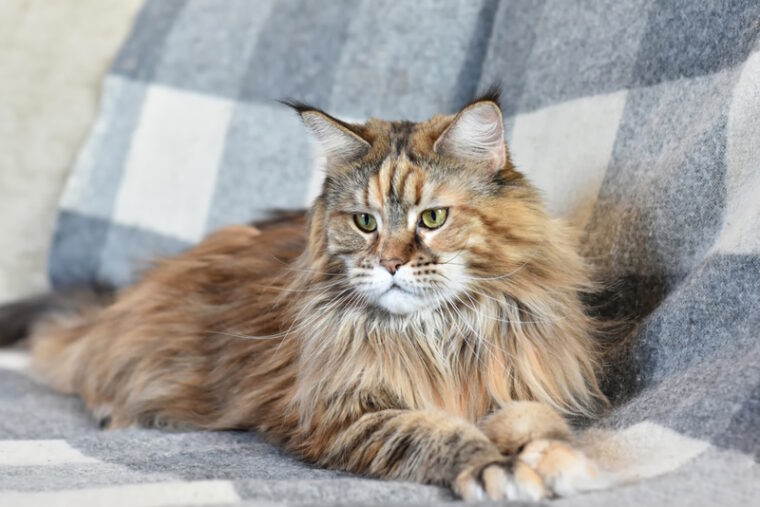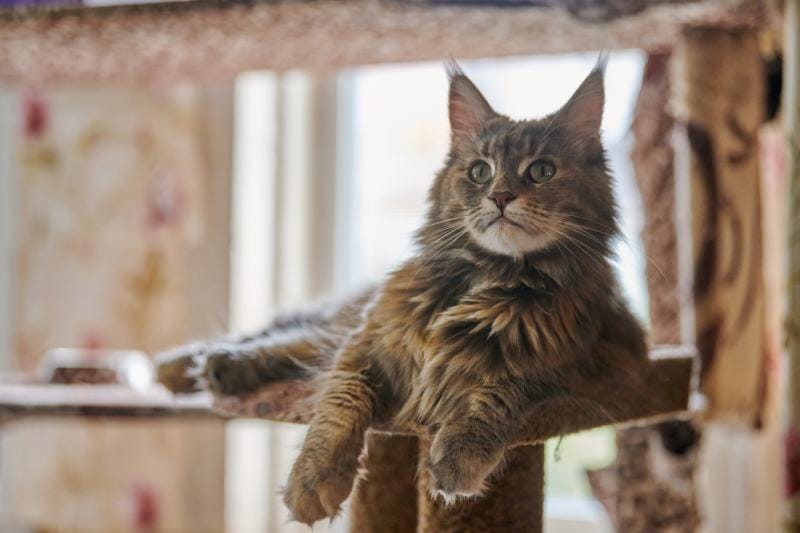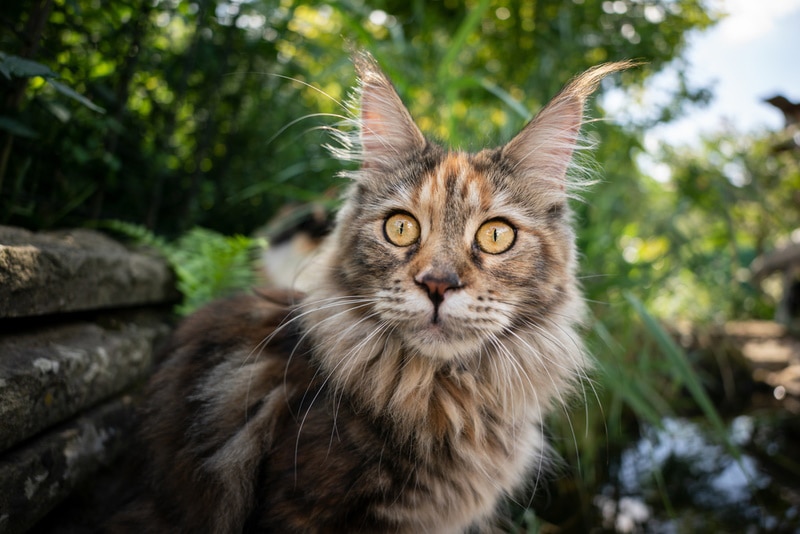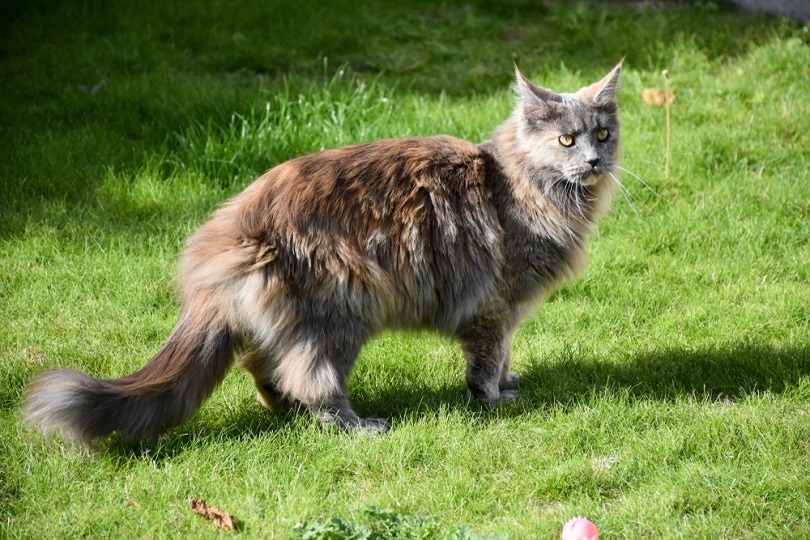
Click to Skip Ahead
The Tortie Maine Coon is a Maine Coon cat with a tortoiseshell pattern. The gorgeous bicolor design and long hair make the Tortie Maine Coon a unique feline that looks like no other. They are lovable, loyal, independent, gentle, and mischievous.
If you’re looking for a cat that you don’t have to spend all day with but who will curl up in your cat to watch TV when it feels like it, the Tortie Maine Coon is for you. We’ll provide you with a few pictures, facts, and history about the exceptional Tortie Maine Coon below.
Breed Overview
Height
9.8–16.1 inches
Weight
8–25 pounds
Lifespan
9–15 years
Colors
mixes of red, black, brown, and orange
Suitable for
Those looking for an affectionate and low-maintenance cat
Temperament
Loving, independent, gentle, mischievous
The Tortie Maine Coon isn’t a separate breed; it is simply a Maine Coon with a genetic mutation that gives it the “tortoiseshell coloring.” Despite merely having a different coloration, tortoiseshell cats tend to have personality differences from those without the bicolor pattern, creating an independent, loving, and mischievous feline.
Maine Coon Cat Characteristics

The Earliest Records of the Tortie Maine Coon in History
We don’t actually know where the Maine Coon comes from. We know the breed originated in Maine and is the US’s oldest native cat breed, but the ancestors of the Maine Coon remain a mystery. Although they are basically guesswork, there are two theories.
The first theory is that they descended from Norwegian forest cats that were brought over by the first American settlers to New England. The second and far more interesting theory is that they descend from Marie Antoinette’s cats brought to America as part of a plan to break her out of prison.
So, the story goes that after the French royal family attempted to flee from the royal palace in Paris to escape the French Revolution, they were arrested and imprisoned. Royalists concocted a scheme to smuggle the royal family out of the country to America, which most likely would’ve granted them asylum since King Louis funded the American Revolution. A ship called “The Sally” was docked and preparing to head back to Maine, and Captain Clough was willing to take the royal family with it.
The royal family never made it to the ship as they were executed first, but some suggest that a few of Marie Antoinette’s Turkish Angoras may have been on the boat and sailed to Maine.

How the Tortie Maine Coon Gained Popularity
The Maine Coon gained popularity very quickly by being a standout in many cats shows across the nation, including the very first. The first cat show in the United States of America was won by a Maine Coon named “Cosey” in 1895. This, along with their unique and striking appearance, quickly made the Maine Coon a favorite of the American people.
Despite the breed’s popularity waning in the early 20th century, due to the popularity of the Persian, they made a full recovery in the 1950s and haven’t stopped since.
Formal Recognition of the Tortie Maine Coon
The first mention of a Maine Coon was in 1861, but it would take a long time for the breed to be recognized. The first Maine Coon club, the Central Maine Cat Club, wasn’t set up until 1950. The Central Maine Cat Club helped the Maine Coon regain the popularity it had begun to lose 50 years earlier but was dissolved in 1960.
In 1968, another club known as the Maine Coon Breeders and Fanciers Association was formed and continued promoting and preserving the breed. The breed was finally recognized by The Cat Fanciers Association in 1975 and then by The International Cat Association in 1979.


Top 4 Unique Facts About the Tortie Maine Coon
1. Male Tortoiseshell Cats are Extremely Rare
Only 1 out of every 3,000 tortoiseshell cats is male, and they’re usually sterile. Add to that the fact that Maine Coons aren’t the only cat that can have the tortoiseshell pattern, and a male Tortie Maine Coon is even rarer.
2. Edgar Allan Poe Owned a Tortoiseshell Cat
Famed writer and poet Edgar Allan Poe owned two cats, one of which was a Siamese and the other a tortoiseshell cat named “Catarina.”
3. Maine Coons Like Water
It’s common knowledge that cats hate water, but the Maine Coon is the exception. They have water-resistant fur, are strong swimmers, and many seek out the water.
4. Argus Filch’s Cat was a Maine Coon
The caretaker’s cat from the Harry Potter series, Mrs. Norris, was a Maine Coon.

Does the Tortie Maine Coon Make a Good Pet?
The Tortie Maine Coon, like most tortoiseshell cats, is fiercely independent and mischievous, so if you want a docile lap cat, you’re looking in the wrong place. The Tortie Maine Coon makes a perfect pet for an adventurous owner who wants a cat that doesn’t require constant attention but is still loving and loyal.
The Maine Coon is also an easy cat to look after because of its independence, but it requires daily grooming to prevent tangling and mats in its coat. It may be too large and energetic to live with young children but gets along with older children and other pets.

Conclusion
The Tortie Maine Coon makes a great pet, though it is pretty independent. If you’re looking for a loving cat that never fails to entertain you, the Tortie Maine Coon is the right breed for you. It doesn’t mind spending time alone and rarely suffers from separation anxiety, but because of its thick fluffy coat, it requires daily grooming to keep its fur healthy and shiny.
See also:
- Tortoiseshell Norwegian Forest Cat: Facts, Origin & History (with Pictures)
- Tuxedo Maine Coon: Pictures, Care Guide, Temperament & Traits
Featured Image Credit: Akifyeva S, Shutterstock





